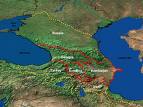Armenia: Georgia’s Defeat Prevented Wider Caucasus War

Armenia would be in a state of war should Georgia’s plan not have failed in 2008
-Azerbaijan was preparing a war against Armenia along with Georgia, yet Russia’s actions frustrated its plans. “Armenia would be in a state of war should Georgia’s plan not have failed in 2008.”
Last year’s August events in Georgia showed the true position of interested parties, politologist Sergey Shakaryants told a news conference in Yerevan.
According to him, the Georgian-Russian conflict played a crucial role for Armenia. “I thought that the NKR [Nagorn Karabakh Republic] conflict settlement will serve a as precedent to other unacknowledged states of Transcaucasia, but the opposite happened,” the Armenian politologist said, stressing that even unacknowledged states like Abkhazia and South Ossetia were acknowledged, still the NKR was not.
According to Sergey Shakaryants, Azerbaijan was preparing a war against Armenia along with Georgia, yet Russia’s actions frustrated its plans. “Armenia would be in a state of war should Georgia’s plan not have failed in 2008,” he said, adding that last year Azerbaijan thrice attempted attacks on the NKR, yet the attempts were frustrated thanks to NKR forces.
On August 8, during the night and early morning, Georgia launched a military offensive to surround and capture the capital of [the] Republic of South Ossetia, Tskhinvali, thus breaking the terms of the 1992 ceasefire and crossing into the security zone established therein.
The heavy shelling, which included Georgian rockets being fired into South Ossetia, left parts of the capital city in ruins, causing a humanitarian crisis.
Russia sent troops across the Georgian border into South Ossetia. In five days of fighting, the Russian forces captured the regional capital Tskhinvali, pushed back Georgian troops, and largely destroyed Georgia’s military infrastructure using airstrikes deep inside the smaller country’s territory.
On August 12, Russian President Medvedev said that he had ordered an end to military operations in Georgia. Later on the same day, Russian President Medvedev approved a six-point peace plan brokered by President-in-Office of the European Union, Nicolas Sarkozy, in Moscow; both sides were to sign it by the 17th.
On August 27, President Medvedev of the Russian Federation signed two Presidential decrees recognizing the Republic of Abkhazia and the Republic of South Ossetia as sovereign independent states to authorize the drafting of treaties of friendship, cooperation and mutual assistance with the new states.

